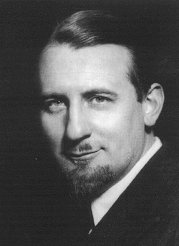|
"All good music, whatever its date, is ageless"

Peter Warlock was a pseudonym of Philip Arnold Heseltine was an English composer
and music critic. He used the pseudonym Peter Warlock as a composer and his real name as a critic, but is now better known
as Peter Warlock
Philip Heseltine was born in London on 30th October 1894 and lost his father as a child. His education
was mainly classical, including studies in Eton College, in Christ Church, Oxford, and in University College London. In music,
he was mostly self-taught, studying composition on his own from the works of composers he admired, notably Frederick Delius,
Roger Quilter and Bernard van Dieren. He was also strongly influenced by Elizabethan music and poetry as well as by Celtic
culture (he studied the Cornish, Welsh, Irish, Manx and Breton languages).
Heseltine wrote his earliest mature compositions, published to critical acclaim under the newly adopted
pseudonym Peter Warlock, in Ireland during 1917-1918. They were followed by a period of concentration on musical journalism;
for a while, he was the editor of the musical magazine The Sackbut. His most prolific period as a composer was in the
early 1920s when he retired in his mother's house in Cefn-Bryntalch, Wales, writing there some of his finest songs, such as
the song-cycle The Curlew to poems by W. B. Yeats.
Between 1925 and 1929, following a quiet period, Warlock and his colleague E. J. Moeran led a wild, boozy life in Eynsford, Kent(though this period has been somewhat over-exagerated by many
writers), having to deal with the local police more than once. For Warlock, however, this was one of the most fruitful
periods of his life, but by the end of the 1920s his creativity was on the decrease and he had to support himself on music
criticism again. He was suffering from severe depression, but whether his death from gas poisoning at the age of 36, on 17th
December, 1930, was a suicide or an accident, is not known.
|
 |
|

